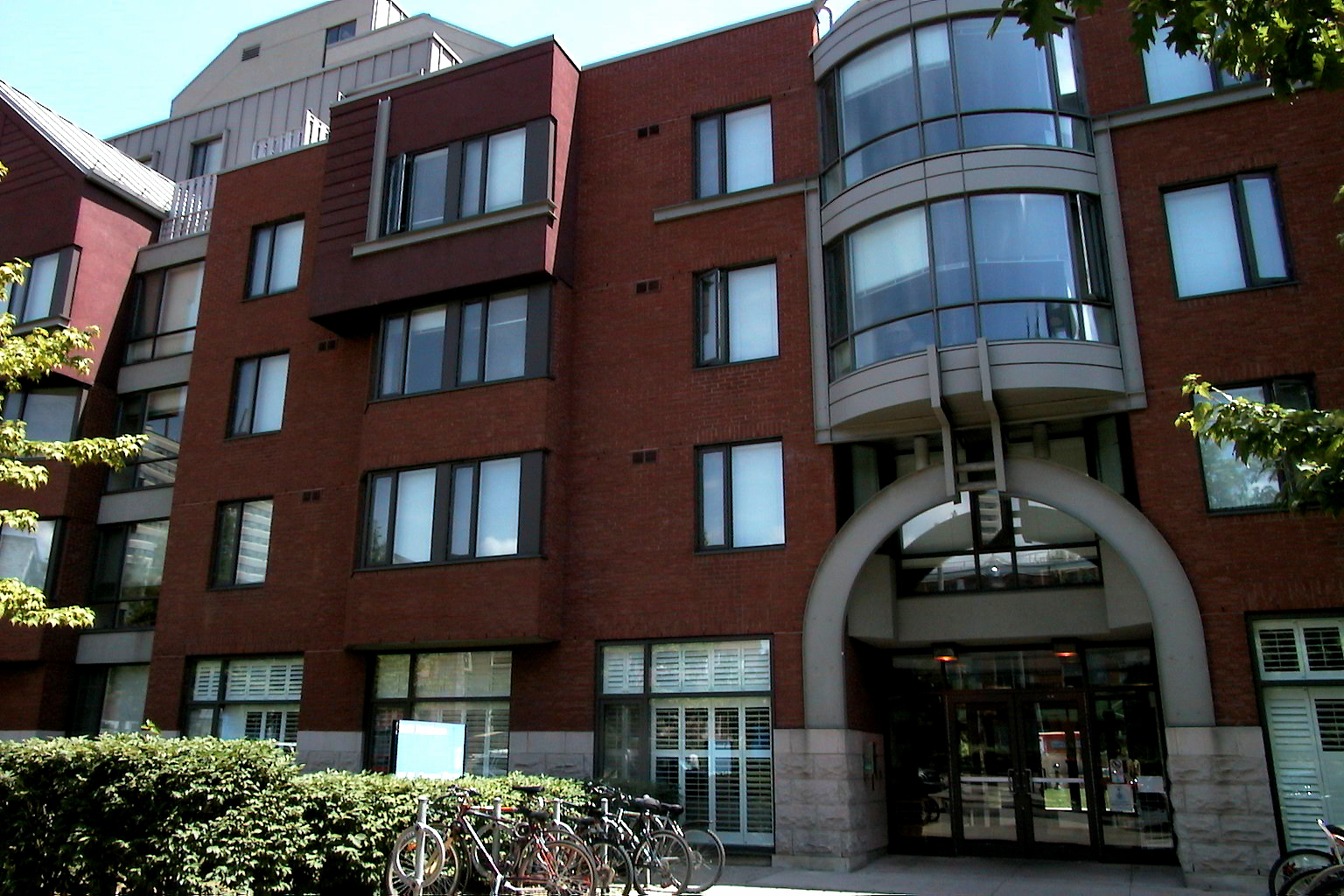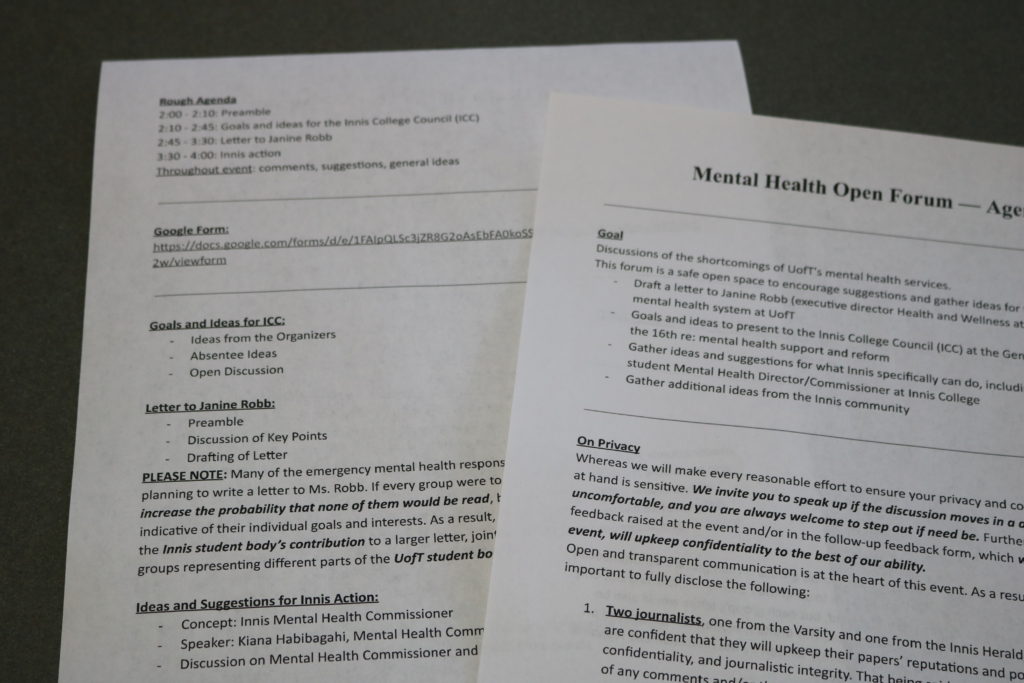Addressing “the shortcomings of UofT’s mental health services”
Gathering in the Innis Residence Events Room on March 29th, Innis first-years Oliver Daniel, Annie Liu, Kathy Sun, and Jehan Vakharia hosted the first of a series of Mental Health Open Forums in response to the recent death at Bahen Centre and resounding calls for mental health reform. Among the topics brought to the table, one key goal was to discuss the creation of a Mental Health Commissioner within the Innis College Student Society (ICSS).
According to Vakharia, a dedicated position for mental wellness in the ICSS would translate into a conscious allotment of resources and finances for events and campaigns around mental health awareness and support. If passed in a Fall semester referendum, the position would be ratified for the new academic year.
Through these forums, the organizers hope that the Mental Health Commission is formed as a combined community effort that addresses as many needs and concerns as possible.
Opening the floor to discussion, the main idea raised by those in attendance was to implement a peer support training and counselling with students acting as the “front line of support.” Many agreed that having such a network would give students a greater diversity of options to turn to beyond dons, registrars, or the university’s struggling Health & Wellness system.
This suggestion came in response to discussions about the “incredible self-advocacy” that the university expects from students seeking help from U of T’s Health & Wellness Centre. Students characterized the department by its long wait times, short appointments that are limited by annual caps, and treatments that are only available with Health & Wellness prescriptions. One student suggested that Innis host its own open workshops focused on similar coping and therapy strategies.
When asked whether the network would appropriately represent the college’s diverse population, Liu noted that she would ensure an intersectional network that would account for cultural differences, gender and sexuality, and commuter experiences. She also noted potential collaboration with the ICSS International Student Representative to better address that community’s needs.
This year’s Innis Residence don team does not include a commuter don. The Residence Life Coordinator lives in residence full time and functions in a similar capacity to counsellors embedded in colleges.
Concerns were also raised over the mental strain that peer support may place on student counsellors and whether these volunteers would be able to assess their own mental state. Acknowledging that “peer counselling is not a substitute for professional help,” Daniel asserted that volunteers would be trained to a similar level as dons and be aware of other resources to which they can direct students in precarious situations.
Expanding on concerns for peer volunteers, Dean of Students Steve Masse asserted in a follow-up interview that “the wellbeing of both participants and peer helpers must be the foremost priority.” It is therefore crucial, he continued, that the commission prepare and conduct “robust, evidence-based training” alongside professionals. This includes preparing those involved for secondary traumatic stress and vicarious trauma, and discussing appropriate self-care practices.
Guest speaker and Mental Wellness Commissioner for University College Kiana Habibagahi explained that much of her team’s energy is spent either responding to criticisms and advocating change in meetings and reports to administrators, or organizing events that seek to alleviate the general atmosphere. Habibagahi emphasized that, because of her lack of formal training, she sees her role as “resource guide, not resource,” although she has been called upon as a resource in emergency situations.
Daniel and Liu cited the work of mental health commissions under other college student societies, including the Woodsworth College Students’ Association and University College Literary and Athletic Society, as inspiration. The Victoria University Students’ Administrative Council also has a mental wellness portfolio. Should the initiative be realized at Innis, Liu “hopes to inspire other colleges to… consider this idea.”
Where the forum also intended to collect opinions for an open letter to U of T’s mental health administrator Janine Robb co-drafted by student groups across the university, discussion further centred around “the shortcomings of UofT’s mental health services.” Accessibility Services drew similar criticism from the crowd as Health & Wellness did, which came up alongside upsetting experiences with professors who would not recognize accommodation needs.
As discussion grew around the administration’s failure to address ineffective policies and funding, such as the university-mandated leave of absence policy, visiting mental health advocate William Nesbitt voiced his support for the students. He also cautioned that while students’ demands for more and better support are of unquestionable importance, the administration should be approached with a mind for open dialogue to account for differing perspectives and generational disconnects.
Masse also expressed the college’s commitment to working with students to improve mental health supports, noting that the college would be able to facilitate a partnership between students and the university. As “[student mental health] is an issue of critical importance to students and the administration,” Masse continued, “In the coming weeks, I intend to continue discussions with the organizers of the forum to learn more about their ideas and needs.”
“There is certainly an openness to help however we can.”


